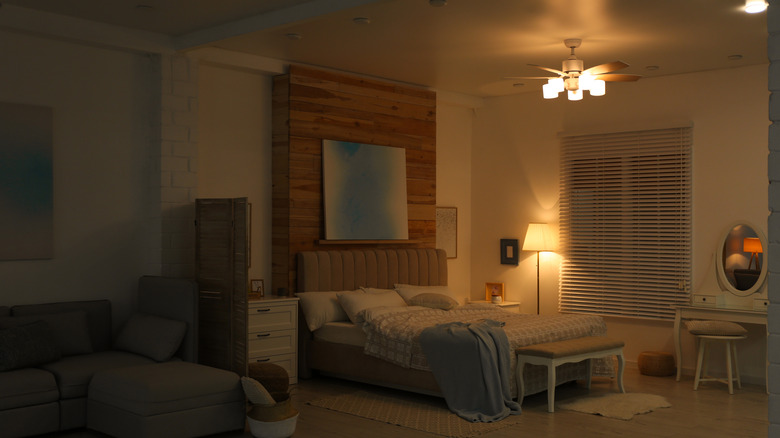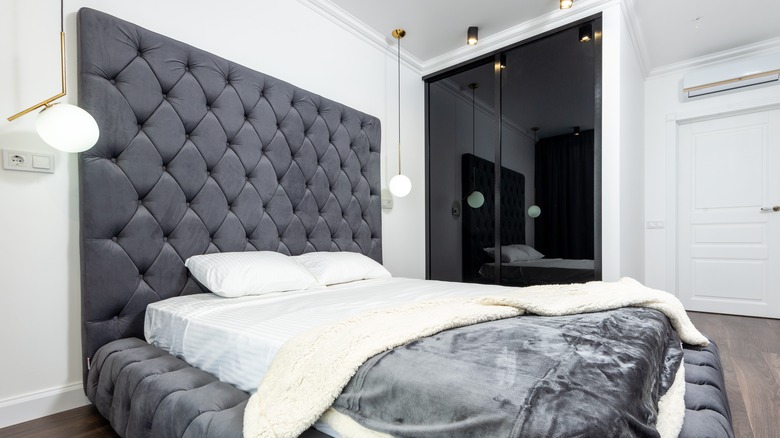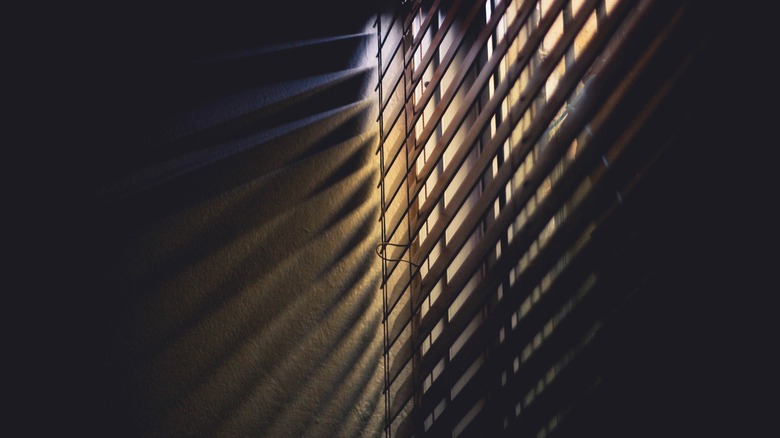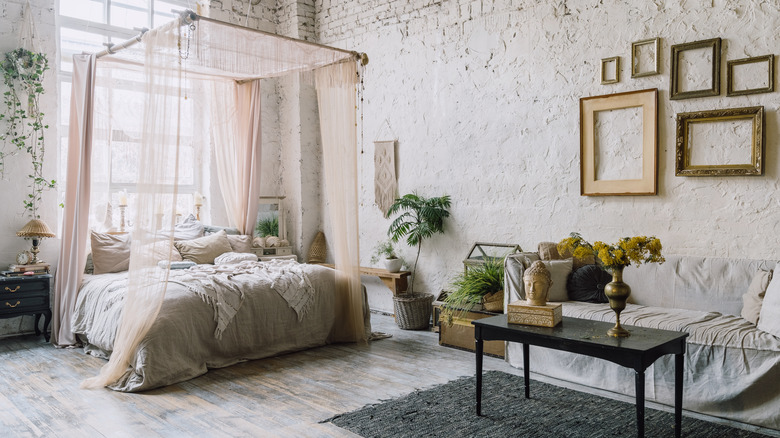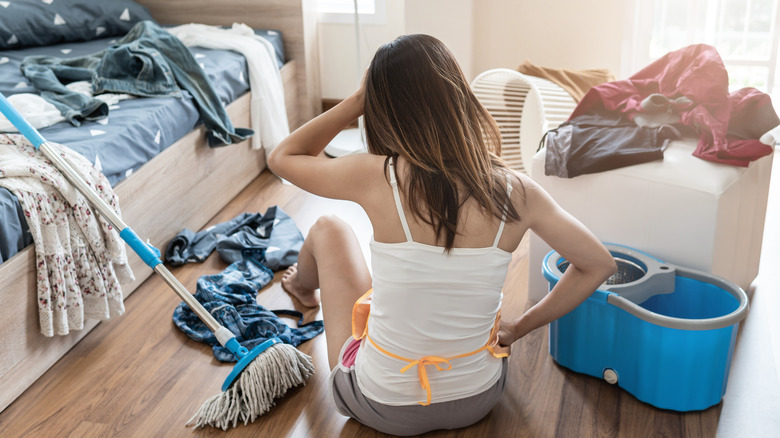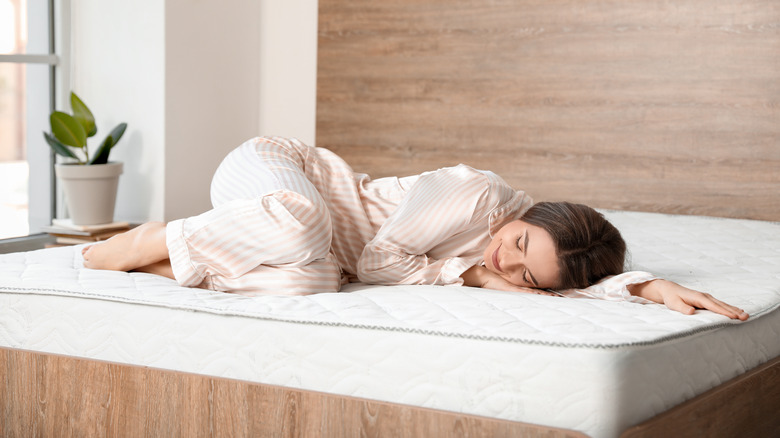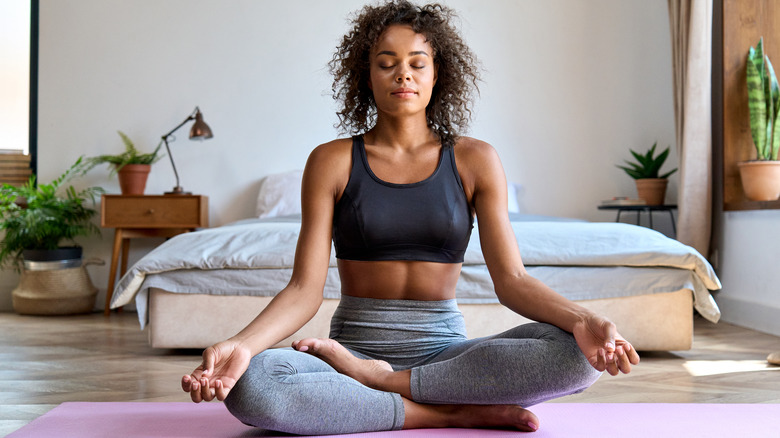How To Create A Peaceful Bedroom For A Good Night's Sleep
Have trouble falling asleep at night? Many people struggle to catch z's for a myriad of reasons. Whether it's drinking too much caffeine at night, staying up too late watching TV, or being worried about the previous day's work, this is an all-too-common problem. One way to have peaceful nights of sleep is to create a safe haven within the bedroom by making it an oasis of relaxation and rest.
According to Buffer Blog, it's important to maintain distinct places to sleep, work, and eat without worrying about distractions or feeling unproductive. Using the bedroom for other purposes besides sleeping makes it hard to train the brain into understanding when it's time to go to sleep. Maintain boundaries between work, play, and rest by having a set schedule of when to do what instead of losing sight of free time and feeling a lack of enjoyment. Having a consistent and well-adjusted sleep schedule isn't tough and could be accomplished by following these steps.
Put away screens
It may be fun to browse through TikTok videos or Snapchat with a friend before going to bed, but what if these become permanent habits and prevent restful sleep? Sleep Foundation said using devices before bed could reduce sleeping time. Technology stimulates the brain, and the sights and sounds of these devices keep it active at night. The body needs melatonin, a sleep hormone, to fall asleep, but the blue light in technology disrupts the production of melatonin. It may be wise to keep a schedule of when to turn devices off at night and stay consistent. Remember to turn down the brightness to induce sleep at night.
When someone isn't getting enough sleep, they tend to feel lethargic, irritable, and have memory troubles (via Active Health), hence the phrase "waking up on the wrong side of the bed." When this happens, people feel sluggish and don't have enough energy throughout the day when trying to complete their daily tasks. People who don't get enough sleep also report having trouble remembering or recalling facts at work or school.
Keep the room cool
Keeping a bedroom cool can be a struggle, especially when temperatures are soaring in the heat of summer. Ever thought about implementing plants in the bedroom? Big plants could be used to block out heat and sunlight, as stated by Best Life. Want cool air to circulate within the bedroom? Think about buying a ceiling fan. Ceiling fans are inexpensive and aren't as costly as air conditioning home systems. For those who desire an at-home air conditioning system, speak with a local HVAC contractor to see what best fits the family needs and stay within a budget.
Air conditioning systems need constant upkeep and maintenance. Make sure the filters are cleaned routinely, because dirt and grime could prevent cool, clean air from infiltrating the house. Program the system by adjusting the thermostat to be at a certain temperature and to turn on at specific times throughout the day. Notice cracks in bedroom windows? Buy a caulking gun to fill in the cracks to block the sunlight heat from becoming a nuisance.
Find comfortable bedding
Since people spend most of their lives in their bedrooms, investing in quality bed sheets should be considered. Sleep Advisor said most standard fabric sheets are made of cotton such as Egyptian, linen, and cotton polyester blends. When buying bed sheets, make sure to find a set in a size that fits the mattress. For aesthetic purposes, search for sateen sheets, which are soft and have a glossy finish. One could never go wrong with long-staple cotton sheets. Long-staple cotton sheets are stronger quality and smoother in texture than the average sheets.
When it comes to summertime, look for moisture-wicking sheets (via Overstock). People who are hot sleepers prefer these sheets as well. For cooler months, toss on a flannel blanket to remain warm. Bed sheets need to be cleaned regularly. Cotton sheets are easy to clean, and could be washed and dried at home. While finding high-quality, affordable bed sheets is a priority, have fun while shopping by looking for patterned or colorful sheets that match the rest of the bedroom décor. Add pizzazz with cutesy throw pillows and accent pillows. A good looking bed set could tie together a whole bedroom.
Invest in darkening blinds
With summer days seeming to stretch on forever, nighttime doesn't fall until almost 10 o'clock in some regions. If you have trouble sleeping when there's still light outside, invest in blackout blinds. According to Kingston Blinds, blackout blinds could improve sleep quality. They're perfect for those who suffer from insomnia, are day sleepers due to their work shifts, have migraines, or for babies and young children who still participate in naptime. These blinds are guaranteed to block out most light.
Not only do blackout blinds prevent light from coming through bedroom windows, they also prevent sound pollution from becoming an issue (via Camille Styles). For people who live in big cities in densely populated areas, blackout blinds may be the solution to alleviate annoying sounds. When it's time to cool down and feel fresh, blackout blinds provide insulation by blocking the heat from windows to keep bedrooms from getting too warm during the summer.
Think of bed placement
Finding the right placement for a bed could make or break the bedroom's design, as well as help or hinder sleep. Thinking of placing the bed against a wall? Maybe place it up against the longest wall in the bedroom to draw attention to the bed's headboard, as suggested by Homely Ville. It may not be the best idea to have a bed pushed up against a corner. Doing so may overwhelm small furniture staples, and it could cause trouble for partners who must climb over each other to their preferred side. Having a bed smack dab in the middle of a room is a lofty decision and may seem ostentatious, but could look right with elegant statement posts and a silky canopy.
When deciding where to put a bed in the bedroom, don't block windows or doors (via Home Décor Bliss). For emergency reasons, it's important to keep windows and doors unobstructed for easy exit points without having to move heavy furniture beforehand. Putting a bed underneath a windowsill is a nice touch to create a focal point with the windows curtains, as well. The windowsill could function as a ledge to contain plaques, photos, and plants. To avoid the harshness of the sun's light, don't place a bed directly across from an open window. Like cell phones and tablets, a window could be a distraction and prevent the mind from being able to rest once night falls.
Lessen room clutter
People can get so comfortable with their bedroom spaces, they end up neglecting basic cleaning duties. Having a bedroom in chaos and disarray could inhibit sleep patterns, as stated by Simple Lionheart Life. Once night approaches, people could be worried about their bedroom messes, causing their mind to be overstimulated. They assume their room isn't suitable for sleeping. Bedrooms can become more disorganized than living rooms and dining rooms due to the privacy bedrooms provide.
Try to clean surface areas first. A little dusting could go a long way after throwing away, and organizing opened mail and old bill statements thrown on desks can help. Check out what clothes need to be donated or stored away in closets and dressers. Room décor also needs an overhaul if items don't match and clash with the bedroom's aesthetic. Take inventory of hanging framed art, ceramics, and other decorative pieces. To declutter your room, complete small cleaning tasks each day by making the bed and clearing away anything unnecessary. A clean room is a restful room.
Get rid of distracting lights
Too much light during the nighttime could disrupt sleep patterns and produce insomnia, per Wirecutter. Lack of light in a bedroom during nighttime allows the brain to settle to focus on rest and winding down. To produce better sleeping habits, go outside during the day to soak up the sun while exercising. This helps sleeping cycles be more "on track." Before falling asleep, turn off or dim any overhead lights in the bedroom. To have some light before going to bed, keep a desk lamp on a bedside table turned to a low setting.
While having too much light in the bedroom during nighttime can cause troublesome sleep patterns, certain lights could produce a calming effect (via Bliss Lights). Incorporating blue laser lights in a bedroom could enhance work performance while allowing the person to feel a wash of calm over them. Green laser lights are calming, as well, and work in conjunction with the sleeping hormone melanopsin, which helps keep sleeping cycles in sync. An awesome way to relax before bed is to have a galaxy of sky laser lights above the ceiling. The faux stars and nebula will enrich nightly senses to soundly snooze.
Find a noise machine
People may need to use a white noise machine to be lulled to sleep. According to Healthline, white noise machines are used to block out emergency sirens, dogs barking, and speeding automobiles. White noise machines produce sounds at various frequencies that are audible to the human ear. In addition to white noise machines, pink noise machines also help with sleep. Pink noise machines produce deeper frequencies of sounds found in nature like rustling leaves, rushing ocean waves, and heavy rainfalls.
Brown noise machines utilize decreasing octave frequencies and could reduce ear ringing (via Sleep Foundation). Research has found that brown noise machines synchronize brain waves or mask background noises. Before purchasing a sound machine, think of having a stable budget before selecting. Most sound machines range in price from $20 to $100. Read customer reviews online. Be sure to find a sound machine with a clean loop, meaning the beginning and the end of the recording are continuous. Sound machines have their own timers and could be adjusted based on what time someone wants to fall asleep. Beware ones that have pre-set time blocks, which may only be adjusted at certain times.
Keep work away from the bed
While many people work remotely from home, there's downsides to working in the bedroom and on the bed. People find it hard to disassociate work from sleeping, as suggested by Ladders. If there's no other place but to work in the bedroom and on the bed, find a way to cover the space once the workday is completed. Throwing a blanket on the bed or having room dividers to cover the area before going to sleep are helpful solutions. Take breaks throughout the day by leaving the bedroom to get food, or to go for short walks.
People who work on their beds tend to think of work throughout the rest of the night and don't feel fully productive (via Healthline). Since working on the bed is comfortable, people tend to lie down on their stomachs or sides instead of sitting up straight. By sitting unevenly on the bed, it could distort the curvature of the spine, causing back pains in the future. Create a proper bedroom workspace by placing a desk or table to work inside of the bedroom. If there's not enough space, find a comfortable foam lap desk to do work on. Tidy up the bed and other areas of the bedroom to reduce stress, and devise a work schedule — and stick to it — to keep work organized.
Have a peaceful scent in the bedroom
Before going to bed, light a candle or spray the bedroom with a scent that relaxes and calms to induce sleep-fulfilled nights. Our Sleep Guide said candles are a trendy way to introduce calming smells into the bedroom. Candles have relaxing scents, are pleasant look at, and are easy to change out for seasonal or holiday purposes. The downsides to using candles is that they could pose fire safety hazards, as well as become messy due to wax melting. An effortless way to make the bedroom smell good is to wash linens with lavender detergents. Lavender is sweet, floral, and great to use during the summertime. Buy antimicrobial linen sprays to freshen up sheets or pillowcases. When flowers are blooming, pick them and place them in a vase in the bedroom.
There are specific scents that help people unwind. Rosemary helps people feel energized and relaxed throughout the day (via Homesick). Lemon-scented room sprays or scent plug-ins invoke memories of having summertime lemonade stands. If floral or fruit scents don't appease people, peppermint releases head tension and calms nerves with its refreshing scent.
Buy a comfortable mattress
Find a mattress that's not only comfortable, but also dependable. Think about how firm the mattress should feel. Sleep Foundation says mattresses range in firmness from extra soft to extra firm, and they are structured for varying body weights and shapes. Poor posture or staying in cramped positions for extended periods of time can cause chronic back pain. Those who suffer from lower back pain may benefit by using medium-soft or medium-firm mattresses. For those who suffer from middle or upper back pain due to constant twisting and turning, find mattresses that release back pressure. Mattresses range in cost from $600 to $2,000 and come in foam, innerspring, hybrid, latex, and airbed varieties.
Sleeping positions also determine what mattress is best to use (via Sleep Advisor). Back sleepers should look for mattresses that are firm and supportive, because mattresses that aren't firm enough could cause back issues in the future. Sleep on either side? Try to find mattresses that are medium-soft. Side sleepers tend to feel pain in their hips or shoulders, so anything too soft may cause more harm, whereas anything too firm may be uncomfortable. Stomach sleepers need to look for medium to medium-firm mattresses to distribute body weight evenly. Evaluate mattresses at bedding stores before purchasing to make the right choice for personal back and sleep needs.
Invest in pajamas
Pajamas improve sleep quality by not only providing warmth during the colder months, but also acting as a barrier of protection against diseases (via Pajamas For Peace). While some people may prefer tossing heavy blankets on the bed during winter to keep warm, studies show that wearing pajamas is more effective. Wearing pajamas to bed is also hygienic. People shed skin cells throughout the day and as they sleep, pajamas act like a cover to contain the shedding. Be sure to wash pajamas on a weekly basis to stay clean and fresh in the evening.
When it comes to body temperature, the American Sleep Association says pajamas help regulate the cooling and warming cycles of thermoregulation during sleep. Avoid wearing pajamas that are too restrictive, or are made from materials that feel scratchy or cause allergic skin reactions. Pajamas come in all kinds of materials, ranging from cotton, polyester, linen, silk, and flannel. Find pajamas that fit and flatter the most, and enjoy their coziness.
Follow a bedtime routine
Make falling asleep a nightly routine by being consistent each night. One way to create a routine is by going to bed and waking up at the same time each day, says Sleep.org. While it may be tempting to stay up late on the weekends, doing so continually could wreck sleep patterns and cause more harm than good. Coffees and sodas should be avoided in the afternoons, and at night. These drinks contain caffeine, which is a stimulant that causes alertness. The effects of caffeine could linger seven hours after consuming. Smoking and drinking alcohol should be avoided at night, as well. Cigarettes contain the stimulant nicotine, and alcohol is a depressant. Drinking too much alcohol at night could cause people to oversleep or feel drowsy the next day. Practice positive stress relief techniques before going to bed, like taking a warm, soothing bath each night, or doing light yoga.
To prepare for bed each night, set an alarm as a reminder of the upcoming time (via Casper). Don't eat too much before going to bed, or consume too many high-caloric meals and drinks. Doing so will cause weight gain and bad eating habits. Want a snack before going to bed? Eat something light and healthy, like yogurt or nuts. Have anxiety before turning in at night? Write a to-do list of things that need to be done the next day, or write positive affirmations in a journal.
Meditate before falling asleep
Meditation isn't just for spiritual practices. According to Sleep.org, meditation allows people to feel less stress and stop worrying. Meditation is considered a mind-body treatment and is used to cure pain in common ailments such as arthritis, irritable bowel syndrome, and migraines. Before going to sleep at night, sit on the bedroom floor in a comfortable position, or lie down in bed, to focus on mindful breathing and being in the present moment.
Check out meditation group meetings in local areas. If someone prefers to do guided meditations on their own, they could download a meditation app on their cell phone. Though it may be difficult to focus at first, practice does make perfect. Some professionals advise against meditating before bed because it could cause alertness and prevent sleep, but the goal of meditation is to seek mental clarity and calmness (via Sleep Advisor).
When lying in bed, do a mindful body scan of how every body part feels from head to toes, (via Florida Medical Clinic). If there's any tension in any part, focus on settling into a sense of healing and positivity to feel whole-body calmness. If the mind begins to wander, focus on a fun-loving hobby, or think of a favorite color. Keep the bedroom cool, dim the lights, put on comfortable pajamas, and slowly drift to sleep.


